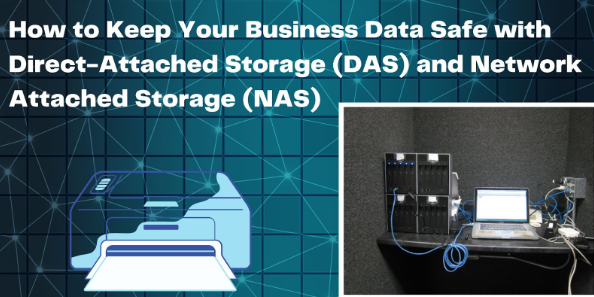Introduction
No matter what type of business you run, data security should be one of your top priorities. In the age of digital information, business data is more vulnerable than ever to potential breaches, hacks, and other cybersecurity threats. That’s why it’s so important to have a robust storage solution in place that can keep your data safe from harm.
There are two main types of storage solutions for business data: direct-attached storage (DAS) and network attached storage (NAS). DAS is a type of storage that is directly connected to a server, while NAS is a type of storage that is connected to a network. Both DAS and NAS have their own advantages and disadvantages when it comes to data security. Let’s take a closer look at each option to see which one is right for your business.
Direct-Attached Storage (DAS)
DAS is a type of storage that is directly connected to a server via an external interface such as USB or Thunderbolt. DAS is typically used for storing smaller amounts of data, such as backups or static files. One advantage of DAS is that it offers fast data transfers since the storage device is directly connected to the server. Additionally, DAS is typically less expensive than NAS due to its simpler design.
However, DAS also has its fair share of disadvantages when it comes to data security. Since DAS devices are directly connected to servers, they are more vulnerable to physical attacks such as theft or damage. Additionally, if a DAS device fails, all of the data stored on it will be lost since there is no way to access it remotely.
Network Attached Storage (NAS)
NAS is a type of storage that connects to a network instead of a server. NAS solution devices are self-contained and typically come with their own operating system and built-in networking capabilities. NAS devices are often used for storing larger amounts of data, such as video or image files. One advantage of NAS is that it offers high scalability since you can easily add more storage capacity by connecting additional NAS devices to the network. Additionally, NAS devices can be accessed remotely, which means you can still access your data even if the physical device is damaged or stolen.
There are some disadvantages to using NAS devices as well, however. One downside is that NAS devices tend to be more expensive than DAS due to their complex design. Additionally, NAS devices can be slow when transferring large amounts of data since the data has to travel through the network before it reaches the device.
Conclusion
Both direct-attached storage (DAS) and network attached storage (NAS) have their own advantages and disadvantages when it comes to data security. It’s important to consider your specific needs in order to decide which type of storage solution is right for your business. If you need fast data transfers and scalability, DAS might be the right choice for you. However, if you’re concerned about security and remote access, NAS might be a better option.









































